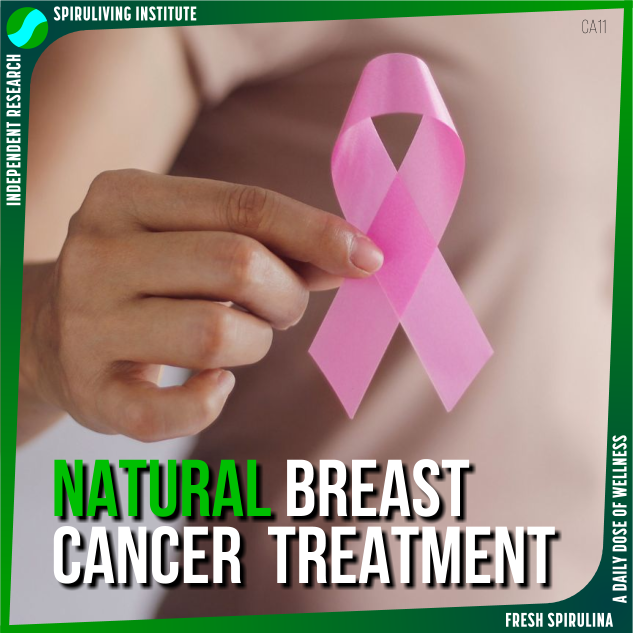
Spirulina Treatment Inhibited Breast Cancer Cell Proliferation After 24 hours
QUICK SUMMARY
BREAST CANCER
Breast cancer is the most common malignant disease in women worldwide, and its incidence is steadily increasing, particularly in developing countries (World Health Organization).
Although conventional medicine has made significant progress in the treatment of breast cancer, pharmacological interventions are fraught with their own endogenous complications, including many known and unknown legal and ethical issues.
In addition, breast cancer cells acquire resistance to chemotherapeutic drugs via different cell signaling mechanisms.
THIS RESEARCH
Various studies have demonstrated anticancer cell proliferation effects of spirulina and its active ingredients both in vitro and in vivo, and our research group has reported a chemopreventive action of spirulina in liver carcinogenesis in a rat model.
The in vitro data suggested that spirulina extract inhibits MCF-7 cell growth via the p53–p21 pathway and induced apoptosis via the p53–Bcl-2–Bax pathway.
To our knowledge, the present study is the first to demonstrate an in vivo chemopreventive effect of spirulina against DMBA-induced mammary carcinogenesis in a rat model.
We show here that spirulina extract clears breast tumors induced by DMBA in rats, a finding that was confirmed by histological analysis and microscopic observations.
In vitro studies revealed that spirulina treatment of MCF-7 breast cancer cells resulted in a number of cellular and molecular changes, including cell growth arrest as an early event at 24 hours after treatment and apoptosis as a late event by 48 hours.
Our molecular data suggest that spirulina treatment increased expression of the genome guardian p53 (Tp53), which in turn induced its transcriptional downstream target p21 gene (Cdkn1a), leading to p53–p21–regulated cell-cycle arrest as an early event.
Furthermore, our results suggest that, as a late event, the increased p53 protein up-regulated expression of its downstream target gene, the proapoptotic Bax, and down-regulated expression of its downstream target gene, the antiapoptotic Bcl2, leading to p53–Bax–Bcl-2–regulated cell death.
With an apparent ability to stimulate whole human physiology, spirulina exhibits therapeutic effects such as antioxidant, antibacterial, antiviral, anticancer, anti-inflammatory, antiallergic, and antidiabetic, as well as a variety of beneficial functions for addressing obesity, diabetes, hypoglycemia, cancer, arthritis, and other degenerative diseases.
In our study, spirulina extract induced apoptosis of MCF-7 breast cancer cells, most likely mediated by the p53–Bax–Bcl-2 pathway. Roy et al also reported down-regulation of the antiapoptotic protein Bcl-2 and up-regulation of the proapoptotic Bax protein in HepG2 cells treated with phycocyanin, demonstrating the ability of phycocyanin to induce apoptosis. Thus, induction of apoptosis by phycocyanin appears to follow a similar mechanism in both breast cancer and hepatocellular carcinoma.
CONCLUSION
Spirulina exhibited remarkable antitumor activity by inhibiting cell proliferation induced by DMBA in rats. Our present study demonstrates, for the first time, that spirulina clears tumor cells from the mammary gland and contributes to the formation of a newer epithelial layer.
Comment from SpiruLiving Institute
1. This study confirms that spirulina has enormous anti-cancer potential.
2. Most of the spirulina phytonutrients - including phycocyanin - that exhibit powerful anti-cancer properties are damaged by powder drying and storage.
3. Fresh and fresh-frozen spirulina, recently becoming available in many countries, can contain 10x higher levels of powerful anti-cancer phytonutrients - including phycocyanin - than found in dried spirulina. These include beta-carotene, chlorophyl, zeaxanthin, ascorbic acid, in addition to 22 different phenols and 11 different flavonoids.
LEARN MORE
Chemoprevention of Rat Mammary Carcinogenesis by Spirulina
The American Journal of Pathology
SLI-CA11
Spirulina Topics:





